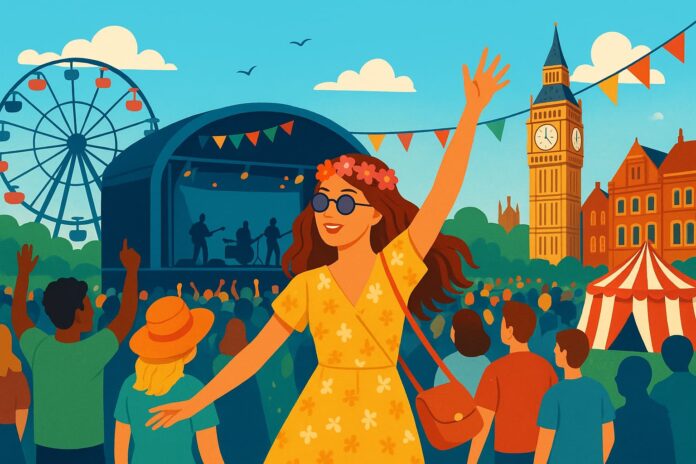The UK is home to some of the world’s most iconic festivals, each offering a unique blend of music, arts, culture, and history. From the muddy fields of Somerset to the cobbled streets of Edinburgh, festivals here are unforgettable experiences that go beyond just entertainment. Whether you’re a music lover, an art enthusiast, or a foodie, these eight UK festivals should be on your travel bucket list.
Introduction
UK festivals are much more than events—they’re cultural phenomena that reflect the nation’s rich history and diversity. Attending a festival allows you to immerse yourself in music, art, literature, and local traditions, all while connecting with people from around the world. From small, intimate gatherings to massive, multi-day spectacles, there’s something for every kind of traveler.
While hundreds of festivals take place every year across the UK, some have become legendary for their scale, line-up, and cultural significance. In this guide, we explore eight of the most iconic festivals, providing practical tips, highlights, and fun facts to help you plan your visit and make the most of each experience.
1. Glastonbury Festival – The Ultimate Music Experience
Overview
Glastonbury is synonymous with music festivals. Located on a sprawling farm in Somerset, this iconic event attracts more than 200,000 attendees every summer. Beyond the music, it features theatre, circus performances, comedy, and wellness areas. The festival has become a cultural institution, drawing both established artists and emerging talent from around the world.
Tips for Attending
- Purchase tickets early; they sell out within minutes.
- Bring wellies and waterproof clothing for rainy days.
- Use public transport or shuttle services to avoid traffic.
- Stay hydrated and pace yourself over multiple days.
Must-See Acts
Top headliners often include global stars like Adele, Paul McCartney, and Coldplay. Smaller stages offer the chance to discover new artists and genres, from folk to electronic. Don’t miss surprise performances—Glastonbury is famous for unexpected collaborations.
Did You Know?
Glastonbury has a “Green Fields” section dedicated to sustainability, with workshops on eco-living and activism. It also runs initiatives supporting mental health awareness and local charities.
2. Edinburgh Festival Fringe – The World’s Largest Arts Festival
Overview
Held every August, the Edinburgh Festival Fringe is the largest arts festival in the world. The entire city becomes a stage, featuring thousands of performances, including theatre, comedy, dance, music, and experimental arts. It’s a playground for artists to test new ideas and push creative boundaries.
Tips for Attending
- Book tickets for popular shows well in advance.
- Explore free street performances for spontaneous entertainment.
- Stay central to maximize access to venues and restaurants.
Highlights
Expect stand-up comedy from rising stars, immersive theatre experiences, and experimental performances that challenge traditional art forms. Workshops and Q&A sessions allow audience interaction with artists.
Did You Know?
The Fringe began in 1947 when eight theatre groups performed uninvited alongside the Edinburgh International Festival. Today, it hosts over 50,000 performances across 300 venues.
3. Notting Hill Carnival – Europe’s Biggest Street Party
Overview
Celebrating Caribbean culture, the Notting Hill Carnival takes place every August in London. Streets come alive with parades, steel bands, colorful costumes, and delicious Caribbean food. It’s a celebration of music, dance, and multiculturalism, attracting over a million visitors annually.
Tips
- Arrive early to secure the best spots to watch parades.
- Dress brightly to match the festive spirit.
- Use public transport due to street closures.
Acts & Entertainment
The carnival features live music stages with soca, calypso, and reggae performances. The “Mas Bands” compete with elaborate costumes and choreography. Street food vendors offer authentic Caribbean dishes, from jerk chicken to roti wraps.
Did You Know?
The carnival was first held in 1966 as a response to racial tension, promoting unity and community spirit in West London.
4. Cheltenham Literature Festival – A Book Lover’s Paradise
Overview
Founded in 1949, Cheltenham Literature Festival is one of the oldest literary festivals in the world. It attracts renowned authors, thinkers, and journalists for talks, panels, and workshops. The festival is a hub for storytelling, debate, and inspiration, drawing literature enthusiasts of all ages.
Tips
- Book sessions early for popular authors.
- Attend workshops and Q&A sessions to interact directly with writers.
- Explore Cheltenham town for historic architecture and local cafes.
Highlights
Hear bestselling authors and emerging voices. Topics range from contemporary fiction and history to politics and philosophy. Interactive workshops allow participants to improve their writing skills.
Did You Know?
The festival has hosted literary legends such as J.K. Rowling, Salman Rushdie, and Margaret Atwood, making it a must-visit for literature fans worldwide.
5. Isle of Wight Festival – Legendary Music on the Coast
Overview
Originally launched in the 1960s, the Isle of Wight Festival is a legendary music event with a rich history. Past performers include Jimi Hendrix, The Who, and David Bowie. Today, it remains a major attraction with a diverse lineup, stunning coastal views, and a festival village atmosphere.
Tips
- Book ferry tickets early to avoid delays.
- Dress in layers as coastal weather can be unpredictable.
- Reserve camping spots in advance for a full festival experience.
Must-See Acts
The festival features rock, pop, indie, and alternative music. Daytime performances are family-friendly, while evening shows feature headline acts.
Did You Know?
The original 1970 festival drew over 600,000 people and was one of the largest music gatherings in history, cementing its legendary status.
6. Hay Festival – Where Literature Meets Imagination
Overview
Hay-on-Wye, famously known as the “Town of Books,” hosts the Hay Festival every May/June. It attracts writers, poets, scientists, and thinkers to celebrate literature, ideas, and creativity. The festival blends literary discussions with music, art, and workshops, creating a holistic cultural experience.
Tips
- Explore the town’s many independent bookstores.
- Attend debates, panels, and workshops for interactive experiences.
- Stay in local guesthouses or B&Bs to enjoy the town’s charm.
Highlights
Sessions include talks from Nobel laureates, bestselling authors, and emerging writers. Interactive workshops allow attendees to explore creative writing, storytelling, and public speaking.
Did You Know?
Hay-on-Wye has more bookstores than pubs, and the festival has been recognized internationally as a hub for cultural dialogue and literary innovation.
7. Green Man Festival – Music, Arts, and Nature
Overview
Green Man Festival, held in the Brecon Beacons, Wales, is a blend of music, arts, and outdoor adventure. The festival features live music, literature, wellness activities, and workshops, all set against stunning natural scenery. It’s ideal for those who love festivals with an eco-conscious and alternative vibe.
Tips
- Bring comfortable walking shoes for exploring the festival site.
- Check out wellness and craft areas for unique experiences.
- Be prepared for rain—Wales’ weather can change rapidly.
Acts & Entertainment
Indie, folk, and alternative bands dominate, alongside workshops, comedy, and storytelling sessions. Camping enhances the immersive experience, allowing you to fully enjoy the scenic location.
Did You Know?
Green Man prioritizes sustainability, including recycling, renewable energy, and locally sourced food, making it one of the UK’s greenest festivals.
8. Brighton Fringe – Creativity by the Sea
Overview
Brighton Fringe is the UK’s largest open-access arts festival, running annually for three weeks in May. The city transforms with theatre, music, comedy, circus acts, and visual arts. Artists from across the globe perform in theatres, streets, and unconventional venues.
Tips
- Explore smaller venues for unique and experimental shows.
- Book tickets online for popular performances.
- Combine festival fun with exploring Brighton’s famous pier, beaches, and cafes.
Highlights
Expect interactive theatre, stand-up comedy, circus performances, and workshops suitable for all ages. Street performances and pop-up installations add to the festive atmosphere.
Did You Know?
Brighton Fringe was founded in 2006 as an alternative to Edinburgh Fringe, offering accessible platforms for emerging artists and local communities.
Frequently Asked Questions
1. What is the best time to attend UK festivals?
Most UK festivals take place between May and September. Summer months are ideal for outdoor events like Glastonbury, Isle of Wight, and Notting Hill Carnival. Festivals in spring and autumn focus on arts, literature, and smaller cultural events. Checking the dates in advance helps plan accommodation and transport. Weather preparation is essential, as British weather can be unpredictable, especially in rural festival locations.
2. Are UK festivals family-friendly?
Many UK festivals are designed for families, offering dedicated kids’ zones, workshops, and interactive performances. Brighton Fringe, Green Man, and Isle of Wight provide family-friendly activities and entertainment. It’s advisable to check the festival website for age restrictions and facilities such as toilets, changing areas, and food options. Family attendance allows children to experience culture, music, and arts in a fun, safe environment.
3. How much do UK festival tickets cost?
Ticket prices vary widely. Smaller literary or arts festivals may cost £10–£50 per event, while multi-day music festivals like Glastonbury or Isle of Wight can range from £200–£350 for full passes. Early-bird tickets offer savings, and VIP or camping packages cost extra. Budgeting for travel, food, and merchandise is important. Festival websites often provide detailed pricing and package options to suit different budgets.
4. Do UK festivals provide food and drink options?
Yes, most UK festivals offer extensive food and drink options, ranging from street food to gourmet menus. Many festivals focus on dietary inclusivity, providing vegan, vegetarian, and gluten-free options. Green initiatives like reusable cups and biodegradable packaging are becoming common. Bringing snacks and water bottles ensures convenience during long festival days and helps avoid long queues at food stalls.
5. How do I get to festivals across the UK?
Festival accessibility depends on location. Major events in London, Somerset, and Brighton have excellent public transport, including trains, buses, and shuttle services. Remote festivals may require driving or ferry trips, like the Isle of Wight Festival. Booking travel early avoids last-minute issues. Festival websites provide travel guides and maps, including parking info, shuttle timings, and transport alternatives for smooth arrival and departure.
6. Are camping facilities available at UK festivals?
Camping is a common feature, especially at large music festivals like Glastonbury and Green Man. Options range from basic tent pitches to glamping with enhanced amenities. Facilities include toilets, showers, and secure areas. Booking in advance is recommended due to high demand. Camping enhances the festival experience, fostering community and immersion in nature. Smaller arts festivals may not offer camping, so check beforehand.
7. What should I pack for a UK festival?
Essentials include waterproof clothing, comfortable shoes, sunscreen, hats, reusable water bottles, and portable chargers. For multi-day festivals, tents, sleeping bags, and hygiene items are necessary. Festival tickets, ID, and some cash or cards are required. Checking the weather forecast ensures appropriate clothing. A small backpack keeps essentials handy while enjoying performances, workshops, and activities throughout the day.
Conclusion
UK festivals offer immersive experiences that showcase the nation’s vibrant culture, creativity, and diversity. From the legendary music stages of Glastonbury to the literary brilliance of Cheltenham and Hay, and the colorful streets of Notting Hill, each festival provides a unique way to experience British life. Beyond entertainment, festivals foster community, cultural exchange, and unforgettable memories, making them a must-add to every traveler’s bucket list.
Planning is key to maximizing enjoyment. Booking tickets early, preparing for unpredictable weather, and researching festival schedules ensures a seamless experience. By attending these festivals, visitors can celebrate music, arts, and tradition while creating memories that last a lifetime. With so many festivals to choose from, there’s no better way to immerse yourself in the UK’s rich cultural tapestry.
























